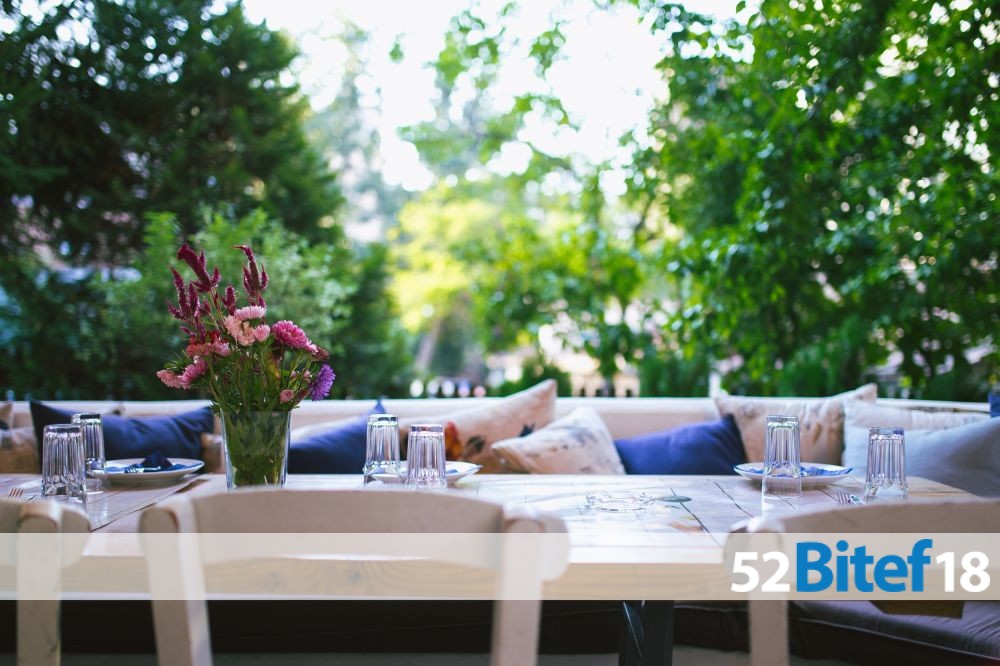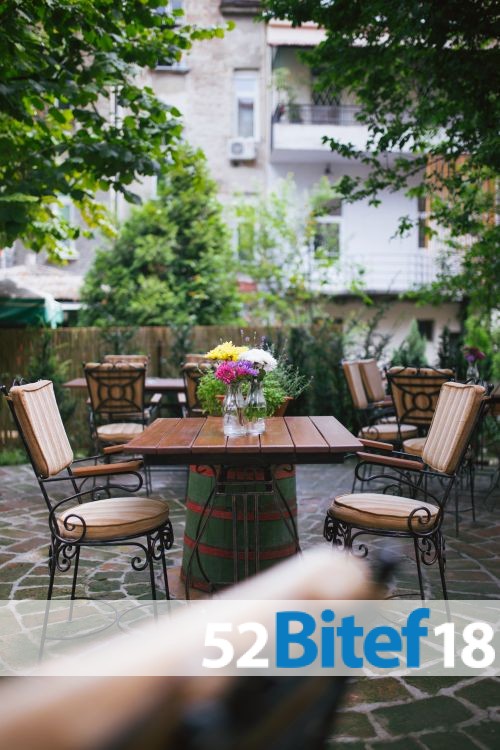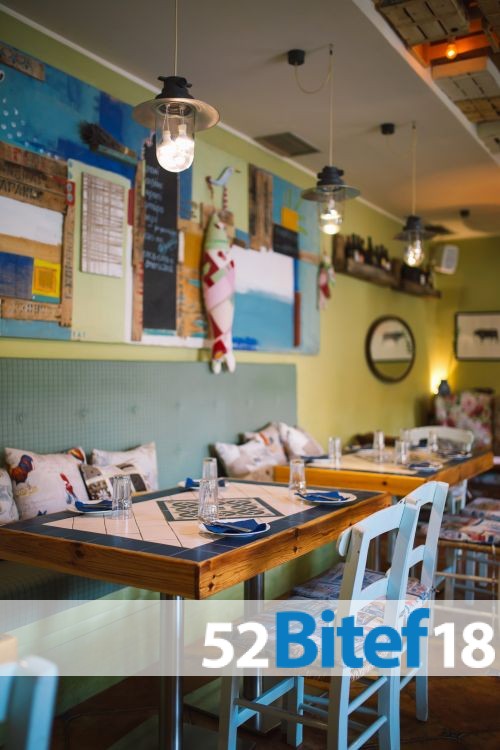Insipiration for Mezestoran Dvorište dates back to 1982 and Rovinj…?
Yes, everything started in the 60ies when we opened a restaurant in Rovinj. My family is from Serbia - my grandfather from Niš, my grandmother from Vojvodina and, at some point, they decided to move to Croatia. They combined efforts with some closed relatives and opened a restaurant Sidro (Anchor), which still exists in Rovinj. As a matter of fact, we have recently celebrated its 52nd anniversary. When I was big enough to see above the counter, I was assigned the task to hand the drinks to waiters, and that was my first contact with hospitality business, with its structure, and the way it functions, with people, with the tension, because there sure is tension, like in any other business. Then, at the age of 13, I got my first salary - my grandfather gave me some money, and in 1983, when I was 14, I started helping the waiters arrange the tables, serve the guests. That is how it was until the war broke out, when we decided to move from Rovinj.
I spent the nineties in Split, and in 1997, I moved to Greece and opened my first place, Wine Bar, which was, I think, the first wine bar in Crete. That story started from my love of wine. That was a small intimate place which could host about thirty people. I established contacts with the emerging wine producers in Crete, who are now, twenty years later, great wine makers.
In 2000, I opened my first restaurant in Crete, and in 2012, I closed my last restaurant in Greece, so I mastered my Mediterranean school mostly in Crete, and Crete is the centre of the Mediterranean cuisine.
The name of my first restaurant was Πράσινα άλογα. It is a play on words in Ancient Greek: literally, it means “green horses”. That phrase is very common, just like the English use pink elephants - everything is pink elephant. Greeks say Πράσινα άλογα thinking of green horses and green horses do not exist. However, the root of that expression, etymologically speaking, comes from Ancient Greek and means “I do things without logic”. It’s interesting that very few Greeks knew the etymology of the phrase and they found it interesting that someone from Serbia opened a restaurant which taught them their grammar and the history of their own language.
You worked in the family restaurant in Rovinj, then in Mykonos, in Crete you opened Wine Bar, and then the restaurants Πράσινα άλογα, Corto Maltese... What is it in the Mediterranean life and cuisine that inspires you so much that you wished to bring the spirit of the Mediterranean to Belgrade?
What inspires me in the cuisine but also in the way of life is the fact that it is marked by simplicity. I think we tend to forget how ubiquitous that simplicity is and how we always, when we analyse something, come up with a very simple way of life or a very simple solution. All of us - in a way which corresponds to our way of living, education, background - tend to complicate our lives. But if we observe life as an entity in which we participate, it is basically very simple. Mediterranean life is simple and so is the Mediterranean cuisine. It relies on fresh products and the dishes consist of up to three ingredients. The western and eastern cuisines tend to complicate the preparation, the dishes are often cooked for several hours, while in Greece and in the Mediterranean, they usually eat fresh ingredients.
The entire offer of Mezestoran Dvorište is based on three core ingredients. For me, it is a success to make something simple from the ingredients which are available, familiar, and if at that they are in season and if our cook is at least a bit inspired to bring some love into it, that’s a winning combination. In my opinion, that simplicity which I keep referring to is reflected in our interior, the food we offer, our taste, the appearance of the plates, even in the service which is friendly to the customers but not excessively. People have recognized that simplicity, so we attract people who share the same qualities - simple, unpretentious people, who, according to our colleagues in other restaurants, are not easily found in Belgrade. Our guests are people who enjoy food, and who enjoy life. There is a phrase which is overused, especially here - hedonism. Here, hedonism is something opposite from the enjoyment in life and in food, because here it is something over-emphasized, something that should be like that, something that has to be highlighted by a bottle of expensive cognac and a cigar.
That is exactly what I had in mind. We have noticed that hedonism in this restaurant is not the hedonism which is often, wrongly, connected to luxury. What is your own measure of hedonism that you have incorporated in this place?
For me, hedonism is the simplicity I keep referring to. Hedonism comes from the Greek word ηδονισμοσ (hedoni). Hedoni is in Greek written with the sound “eta” which we read as “h” so hidoni is, actually hedonism. But hidoni is nothing but the passion itself. The passion for life, for food, for other people, for oneself, that is hedonism. In our culture, it is mostly linked to luxury, which contains very little hedonism and a lot of money, and the desire to show off. Finding hedonism and joy in little things, in any field, in life in general, that is, for me, art, a supreme art. And great things come on their own. That everyday life, the joy in our conversation, the enjoyment in a cup of coffee, that is the essence of enjoyment, i.e. hedonism.
On Mykonos and Crete, you had a chance to meet famous international film stars, politicians… Tell us a bit more about your guests, who they are, but also about your thoughts about that period, what you learned back then that you still practice in life and work.
I had a chance to be in restaurants and serve some famous people - Sylvester Stallone, Sharon Stone, Ronald Raegan, etc. Greek public figures used to frequent those places as well. However, I never had a feeling to be serving a famous person, I never divided people into famous and not famous, known and unknown, although it is usually done. That is what people, probably, recognized as a normal communication and became more open, more forthcoming.
The same goes for Mezestoran. A lot of famous people come, the people I respect, and I am happy to see them here, but I also respect their privacy. The way I see it is - I don’t see any reason to approach their table, introduce myself as the owner, or whatever, but I let them enjoy in peace. Sometimes, I send them a treat, usually as they are leaving, so I don’t have to get introduced and so they would not see the gesture as some kind of personal marketing. I’m simply happy to have people here. Public figures are tired of public life and communication, so I don’t treat them differently or kindlier than the so-called “ordinary” guests. I want everyone to be treated equally.
This is the fourth year of cooperation between Bitef and Mezestoran. What is it that connects them?
Bitef is an institution. Now, then and in ten years - I would like to maintain the cooperation. We are a small Belgrade restaurant that can contribute to an institution, so if we can contribute to someone who has been doing so much for culture and art in 52 years, then it makes me happy as a citizen of this country and a citizen of Belgrade. That has been my motive all along.
It is not only Bitef that you support, but other cultural events in town. too. You seem to truly adhere to the principles of social responsibility, and the sustainability of your restaurant proves that even in the society facing financial and moral crisis, successful long-term cooperation can exist. Could you comment on that, and could you tell us if you see your support of various cultural and artistic projects as a duty and responsibility of a kind?
I would call it a pleasure. I guess all of us are, or we should be, responsible citizens. That is reflected in everything, from our behaviour in traffic, to our attitude to others. Our help might not be a big deal but if we, the small ones, are numerous, it might turn into something big. Everyone who has come to us for some kind of sponsorship has been respected, within our means.
This year, Bitef has a slogan “World Without Us”. What does that mean to you?
Greek philosopher Diogenes was wandering around Agora with a lamp, and when people asked him what he was looking for, he said “for an honest man”. So, I would ask - world without what kind of people? And what are people? What is the definition of modern man? Only then could we open a philosophical discussion.
It is amazing how remote that history seems and yet how relatively close it is, and how close we are to that spiritual system of values and Diogenes’ search for honest men. We have the same situation today. We might say that it is getting more difficult, but I think that, in relation to the law of universe, those are not great deviations from what was happening some 3000 years ago, for example. I think that each of us is one character, one conscience and that that conscience has its features and that it has not changed much since my predecessor who lived some 2000 years ago.
However, there is a more recent phenomenon which is not only a consequence of digital technology. That is alienation, something which didn’t use to exist. People didn’t use to be such strangers to one another, and I think that now they are. I find it interesting, this lack of trust, lack of respect, hiding behind our shields, and rage which is not caused by financial situation because everyone is angry in their own way. There really is something deeply disturbed in human relationships.



